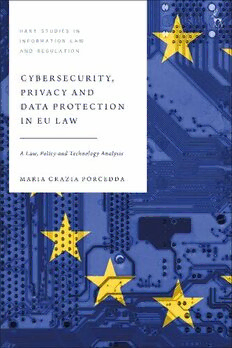
Cybersecurity, Privacy and Data Protection in EU Law: A Law, Policy and Technology Analysis PDF
345 Pages·2023·6.94 MB·English
Most books are stored in the elastic cloud where traffic is expensive. For this reason, we have a limit on daily download.
Preview Cybersecurity, Privacy and Data Protection in EU Law: A Law, Policy and Technology Analysis
Description:
Is it possible to achieve cybersecurity while safeguarding the fundamental rights to privacy and data protection? Addressing this question is crucial for contemporary societies, where network and information technologies have taken centre stage in all areas of communal life. This timely book answers the question with a comprehensive approach that combines legal, policy and technological perspectives to capture the essence of the relationship between cybersecurity, privacy and data protection in EU law. The book explores the values, interconnections and tensions inherent to cybersecurity, privacy and data protection within the EU constitutional architecture and its digital agendas. The work's novel analysis looks at the interplay between digital policies, instruments including the GDPR, NIS Directive, cybercrime legislation, e-evidence and cyber-diplomacy measures, and technology as a regulatory object and implementing tool. This original approach, which factors in the connections between engineering principles and the layered configuration of fundamental rights, outlines all possible combinations of the relationship between cybersecurity, privacy and data protection in EU law, from clash to complete reconciliation. An essential read for scholars, legal practitioners and policymakers alike, the book demonstrates that reconciliation between cybersecurity, privacy and data protection relies on explicit and brave political choices that require an active engagement with technology, so as to preserve human flourishing, autonomy and democracy.
See more
The list of books you might like
Most books are stored in the elastic cloud where traffic is expensive. For this reason, we have a limit on daily download.
